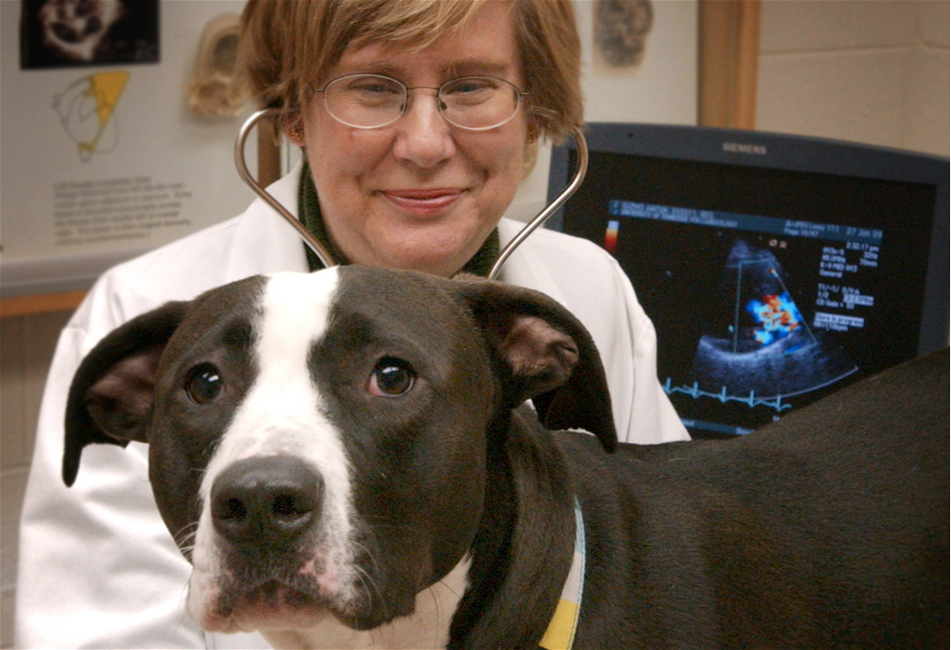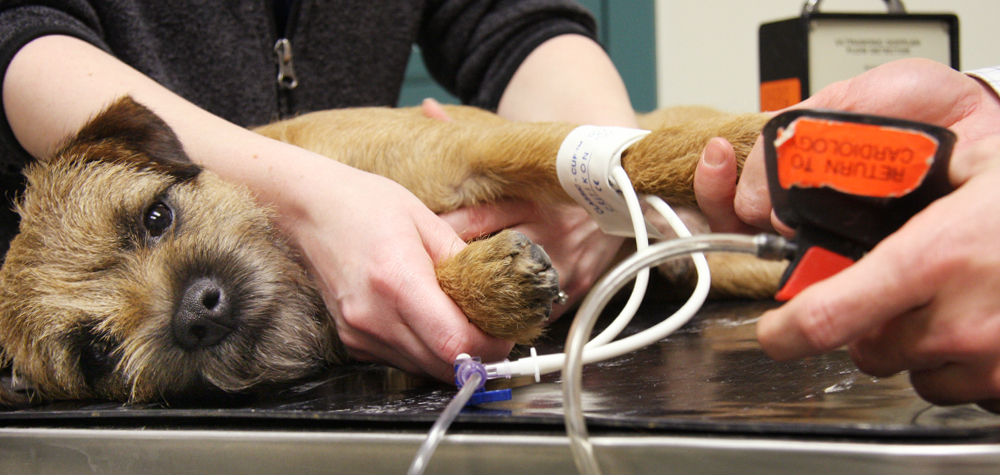How Accurate Are CT Scans For Dogs in Detecting Health Issues?}
Wiki Article
Checking Out the Crucial Solutions Provided by a Vet Cardiologist: Recognizing Ultrasound and CT Scan Techniques
Veterinary cardiologists play an essential duty in the health and wellness of pets by detecting and treating different heart conditions. They utilize sophisticated imaging techniques, such as heart ultrasound and CT scans, to supply accurate analyses. Each approach has its unique advantages and applications. Understanding these strategies is necessary for animal owners looking for the finest take care of their friends. What aspects should pet dog owners take into consideration when choosing in between these diagnostic devices?
The Duty of Vet Cardiologists in Family Pet Health Care
Vet cardiologists play a vital duty in the medical care of pet dogs, concentrating especially on detecting and dealing with heart-related problems. They have specialized training that permits them to analyze intricate analysis examinations and recognize different cardiovascular issues. These professionals utilize advanced techniques, such as echocardiography and electrocardiography, to examine heart function and structure accurately.Veterinary cardiologists additionally develop customized treatment plans that may consist of drugs, lifestyle alterations, and, sometimes, medical interventions. Their expertise includes enlightening pet dog proprietors regarding heart health and wellness, stressing the relevance of regular exams and very early detection of prospective issues. Collaboration with basic vets is crucial, as it ensures extensive care for pets with thought heart concerns. By providing specialized services, veterinary cardiologists significantly enhance the lifestyle for pet dogs and offer tranquility of mind for their owners, reinforcing the relevance of heart health and wellness in overall pet health.Common Heart Problems in Animals
Common cardiac concerns in animals can greatly affect their health and top quality of life. Heart murmurs, different types of cardiomyopathy, and hereditary heart defects are amongst the most common conditions that veterinarians experience. CT Scans For Dogs. Understanding these problems is important for pet dog owners to ensure prompt medical diagnosis and suitable therapyHeart Murmurs in Pets
Heart whisperings can be a source of issue for pet dog owners, they are not always a sign of serious wellness issues. A heart murmur is an uncommon audio produced by unstable blood circulation within the heart. In pet dogs, these murmurs can be triggered by numerous factors, including hereditary heart issues, shutoff problems, or perhaps tension during assessments. Several pets with heart murmurs lead normal lives without considerable wellness influences. To determine the underlying cause, veterinary cardiologists frequently utilize diagnostic methods such as echocardiograms and Doppler ultrasounds. Early detection and evaluation are crucial, as they might aid take care of any kind of possible heart concerns properly. Pet dog proprietors are urged to consult their vet for a thorough assessment if a heart whispering is detected.Cardiomyopathy Kind Explained
Cardiomyopathy incorporates a team of conditions impacting the heart muscle, causing jeopardized cardiac function in family pets. The most common types consist of expanded cardiomyopathy (DCM), hypertrophic cardiomyopathy (HCM), and restrictive cardiomyopathy (RCM) DCM mainly affects dogs, causing the heart to enlarge and damage, which decreases its ability to pump blood properly. On the other hand, HCM is much more prevalent in cats, identified by the thickening of the heart walls, usually leading to obstructed blood circulation. RCM, though less typical, happens when the heart muscle mass ends up being inflexible, limiting its capability to fill with blood. Each kind presents distinct challenges in diagnosis and therapy, demanding specialized veterinary cardiological assessment to ensure peak monitoring and take care of influenced pet dogs.Hereditary Heart Defects
Genetic heart issues represent a significant classification of cardiac problems in pets, unique from acquired conditions such as cardiomyopathy - CT Scans For Animals. These issues are structural irregularities existing at birth, impacting the heart's regular function. Typical types consist of patent ductus arteriosus, ventricular septal flaws, and pulmonic constriction. Signs might differ widely, ranging from moderate to extreme, and can include exercise intolerance, coughing, and problem breathing. Early diagnosis via advanced imaging techniques like ultrasound is crucial for effective administration. Vet cardiologists play an important function in recognizing these problems and recommending suitable treatment choices, which might include clinical management or surgical treatment. Recognizing congenital heart flaws permits better outcomes and enhanced lifestyle for impacted pet dogsUnderstanding Cardiac Ultrasound: Exactly How It Functions
A substantial variety of vet techniques currently make use of cardiac ultrasound as a necessary analysis device for reviewing heart wellness in pets. This non-invasive strategy makes use of high-frequency acoustic waves to develop pictures of the heart's structure and function. Throughout the treatment, a vet professional uses a gel to the pet's breast and utilizes a transducer to emit ultrasound waves. These waves jump off the heart and bordering frameworks, creating real-time photos on a monitor.Veterinarians can analyze numerous elements of heart wellness, including chamber size, wall activity, and shutoff feature. Additionally, heart ultrasound enables for the detection of irregularities such as fluid accumulation and genetic heart issues. This method is essential for detecting problems that might not show up through basic radiographs. By providing thorough info about the heart's makeup and performance, heart ultrasound aids in formulating reliable treatment prepare for pets dealing with heart problem.The Value of CT Checks in Identifying Heart Issues
Exactly how do CT scans enhance the medical diagnosis of heart disease in vet medication? CT scans supply comprehensive cross-sectional photos of the heart and surrounding frameworks, the original source permitting vets to visualize intricate physiological relationships. This imaging technique is specifically useful in identifying hereditary heart flaws, cardiac lumps, and irregularities in capillary. By making use of sophisticated imaging algorithms, CT scans can examine heart chamber dimensions and function, using an extensive view that might be difficult to accomplish with traditional methods.Additionally, CT angiography can picture blood circulation and recognize areas of constriction or obstruction, which is crucial for planning prospective treatments. The speed and precision of CT scans additionally facilitate fast diagnoses, crucial in emergency situation situations. Eventually, the unification of CT checks right into veterinary cardiology substantially boosts the accuracy of diagnoses, enabling targeted treatment strategies and boosting person outcomes for pets dealing with heart disease.Contrasting Ultrasound and CT Check Strategies
While both ultrasound and CT scans are important tools in veterinary cardiology, they use distinctive benefits and constraints that influence their usage in diagnosing heart disease. Ultrasound, or echocardiography, offers real-time imaging of the heart's structure and function, enabling veterinarians to examine heart chambers, valves, and blood flow. It is especially efficient for examining problems like heart disease and cardiomyopathy. Nevertheless, ultrasound might be restricted in envisioning particular physiological frameworks as a result of person dimension or obesity.In comparison, CT scans deal thorough cross-sectional pictures of the heart and bordering cells, making them excellent for recognizing architectural abnormalities, tumors, or vascular issues. CT scans give detailed insights, they call for sedation and may involve radiation exposure. Inevitably, the selection between ultrasound and CT scans relies on the certain medical circumstance, the individual's condition, and the info required for a precise diagnosis.Therapy Options Readily Available With Veterinary Cardiology
Veterinary cardiology provides a variety of treatment alternatives tailored to resolve various heart problems in animals. Therapy plans usually begin with way of living modifications, consisting of diet modifications and exercise adjustments, intended at improving total heart health. Medicines play a vital role, with cardiologists recommending medicines such as diuretics, beta-blockers, and ACE inhibitors to manage signs and symptoms and boost heart function.In a lot more severe situations, interventional treatments, such as balloon valvuloplasty or stent placement, may be needed to minimize clogs or improve blood circulation. For sure congenital heart problems, medical alternatives may be checked out to deal with structural issues. Furthermore, ongoing surveillance and follow-up treatment are important elements of a detailed therapy plan, enabling timely adjustments based on the animal's reaction to therapy. Generally, vet cardiology concentrates on giving reliable, go individualized care to maximize the wellness and health of pet people with heart disease.How to Prepare Your Pet for a Cardiac Assessment
Preparing a family pet for a heart examination is important to assure exact outcomes and a smooth process. Owners need to initially set up the visit with the veterinary cardiologist and talk about any specific requirements or problems. It is suggested to hold back food for a minimum of 12 hours before the examination, as this helps enhance imaging top quality throughout procedures like ultrasound or CT scans.Additionally, maintaining a tranquil setting on the day of the visit can help in reducing the pet's anxiousness. It is helpful to bring along any type of relevant clinical records, including previous examinations and medicines (Cancer Veterinary Near Me). Proprietors ought to also make sure that their animal fits and leashed throughout transport to the clinic. Lastly, familiarizing themselves with the evaluation procedure can assist and relieve worries in asking educated questions throughout the assessment. By adhering my sources to these steps, owners can contribute considerably to the performance of the cardiac examinationRegularly Asked Inquiries
For how long Does a Cardiac Ultrasound or CT Check Take?
The period of a heart ultrasound normally varies from 30 to 60 mins, while a CT scan might take about 15 to half an hour. Aspects such as the person's condition can influence these time estimates.
Are There Any Threats Connected With These Diagnostic Treatments?

Can I Keep With My Pet During the Treatment?
The veterinary facility's policy generally determines whether pet owners can continue to be throughout procedures. While some centers motivate owner presence for comfort, others might need separation to guarantee security and suitable conditions for diagnostic imaging.Just how Much Do These Analysis Tests Typically Cost?
The prices of analysis tests, such as ultrasound and CT scans, usually vary based upon area and facility. Generally, rates range from a couple of hundred to over a thousand dollars, showing the complexity and modern technology involved.
What Is the Healing Refine After a Cardiac Assessment?
The healing process after a cardiac assessment entails keeping an eye on the animal for any kind of immediate reactions, guaranteeing convenience, and limiting exercise. Vets usually give post-evaluation instructions to lead pet owners throughout this essential healing period. Heart murmurs, various kinds of cardiomyopathy, and congenital heart problems are among the most common problems that veterinarians run into. A heart whispering is an abnormal audio produced by unstable blood circulation within the heart. Cardiomyopathy encompasses a group of diseases impacting the heart muscle mass, leading to jeopardized cardiac function in animals. Hereditary heart flaws represent a considerable classification of cardiac issues in animals, distinct from acquired problems such as cardiomyopathy. Ultrasound, or echocardiography, gives real-time imaging of the heart's framework and function, allowing vets to analyze heart chambers, shutoffs, and blood circulation.Report this wiki page